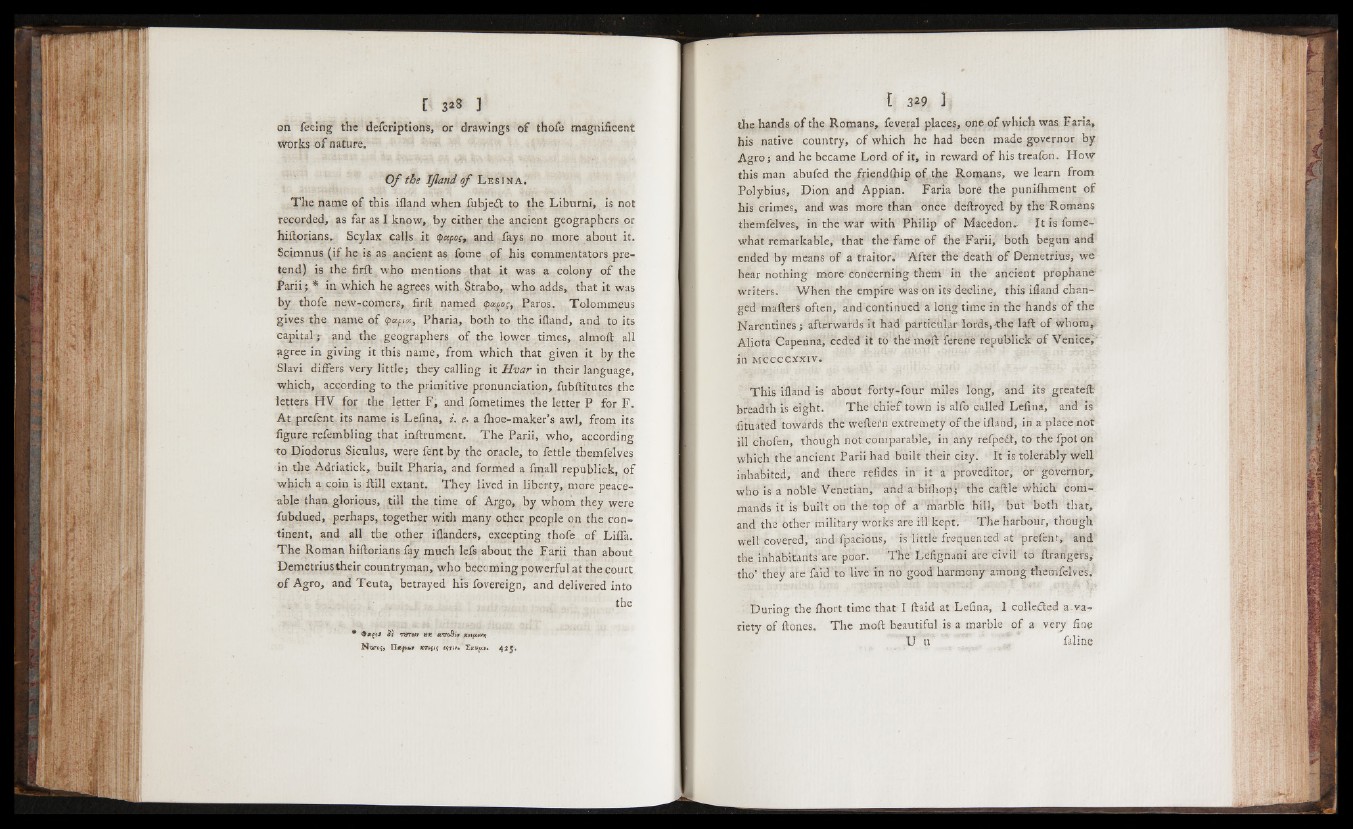
on feeing the defcriptions, or drawings o f thofe magnificent
works o f nature.
O f the IJland o f L e s in a .
T h e name o f this ifland when fubjedt to the Liburni, is not
recorded, as far as I know, by either the ancient geographers or
hiilorians. Scylax calls it <pxpog, and fays no more about it,
Scimnus (if he is as ancient as fome o f his commentators pretend)
is the firft who mentions that it was a colony o f the
Parii; * in which he agrees with Strabo, who adds, that it was
by thofe new-comers, firft named (pageg, Paros. Tolommeus
gives the name o f pafi«, Pharia, both to the ifland, and to its
capital ; and the geographers o f the lower times, almoft all
agree in giving it this name, from which that given it by the
Slavi differs very little; they calling it Hvar in their language,
which, according to the primitive pronunciation, fubftitutes the
letters HV for the letter F, and fometimes the letter P for F.
A t prefent its name is Lefina, i. e. a ihoe-maker’s awl, from its
figure refembling that inftrument. The Parii, who, according
to Diodorus Siculus, were fent by the oracle, to fettle themfelves
in the Adriatick, built Pharia, and formed a fmall republick, o f
which a cpin is ftili extant. They lived in liberty, more peaceable
than glorious, till the time of Argo, by whom they were
fubdued, perhaps, together with many other people on the continent,
and all the other iflanders, excepting thofe o f Liffa.
T h e Roman hiftorians fay much lefs about the Farii than about
Demetrius their countryman, who becoming powerful at the court
o f Agro, and Teuta, betrayed his fovereign, and delivered into
the
• 9«geJ di rurur we umSb xtiftuvri
Nwro$> Httftht CfTiy* Zxvp,». 425.
the hands o f the Romans, feveral places, one o f which was Faria,
his native country, o f which he had been made governor by
Agro; and he became Lord o f it, in reward o f his treafon. How
this man abufed the friendihip of the Romans, we learn from
Polybius, Dion and Appian. Faria bore the puniihment o f
his crimes, and was more than once deftroyed by the Romans
themfelves, in the war with Philip o f Macedon- It is fome-
what remarkable, that the fame o f the Farii, both begun and
ended by means o f a traitor. After the death o f Demetrius, we
hear nothing more concerning them in the ancient prophane;
writers. When the empire was on its decline, this ifland changed
matters often, and continued a long time in the hands o f the
Narentines ; afterwards it had particular lords,-the laft o f whom,
Aliota Capenna, ceded it to thé meft ferene republick o f Venice;'
in M c c c e x x iv .
This ifland is about forty-four miles long, and its greateft
breadth is eight. The chief town is alfo called Lefina, and is
iituated towards the weftein extremely o f the ifland, in a place not
ill chofen, though not comparable, in any refpedt, to the fpoton
which the ancient Parii had built their city. It is tolerably well
inhabited, and there refides in it a proveditor; or governor,
who is a noble Venetian, and a biihop ; the cattle which commands
it is built on the top of a marble hill, but both that,
and the Other military works are ill kept. The harbour, though
well covered, and fpacious, is little frequented at prefent, and
the inhabitants'are poor. The Lefignani are civil to ftrarigers;
tho’ they are faid’to live in no good harmony among fhemfelves.
During the ihort time that I ftaid at Lefina, 1 collected a.va-
riety of ftones. The moft beautiful is a marble o f a very fine
U I f" * *. ’ B faline